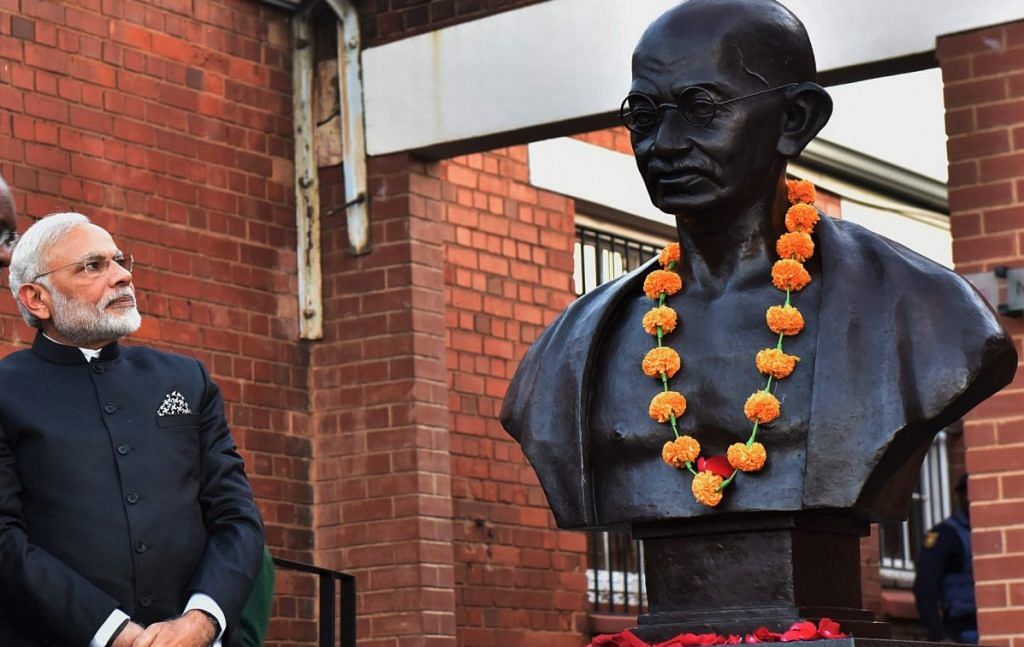Future generations in India will identify Mahatma Gandhi’s spectacles with toilets. Gandhi was no doubt a champion of sanitation, but he was so much more.
Narendra Modi, an astute practitioner of the politics of symbolism, has made Gandhi’s spectacles a symbol of the Swachh Bharat programme. Meanwhile, efforts have been made to elevate Sardar Patel as a greater icon than Mahatma Gandhi. Sardar Patel is a symbol of national unity, and Mahatma Gandhi of sanitation. Sardar Patel gets the world’s tallest statue, Mahatma Gandhi gets lip service.
Modi has asked BJP MPs to take out a padayatra, a 150-km march, in their constituencies. The march shall begin on 2 October, Mahatma Gandhi’s 150th birth anniversary, and culminate on 31 October, Sardar Patel’s 144th birth anniversary.
Also read: Gandhi valued sanitation more than Independence. Modi’s Swachh Bharat is fulfilling his dream
As if that was not enough, the main task of this march will not be to spread the message of either Gandhi or Patel, but of Modi. “The idea is to reach out to the public and seek their feedback on the government’s work and their expectations from us,” according to parliamentary affairs minister Pralhad Joshi. Other issues likely to be taken up in the march are planting trees, cleanliness and the fantastic idea of zero-budget farming.
We can be certain that the Modi government’s celebration of the 150th birth anniversary of the father of the nation will not include propagation of the Mahatma’s central message: non-violence. As incidents of lynching refuse to abate, isn’t Mahatma Gandhi’s 150th birth anniversary a good occasion for the government to carry out a campaign on non-violence? Or, the Modi government could at least take up the Supreme Court’s suggestion of enacting a special law against lynching, carry out an information campaign warning people of legal consequences of lynching and appointing a nodal officer in each district to prevent incidents of lynching.
Today, we are a country that suffers endless violence. Violence against Dalits and women, honour killings and the constant threat of communal riots – there’s no dearth of violence that needs to be addressed. Why, in such violent times, would Narendra Modi ignore Mahatma Gandhi’s central tenet of non-violence?
Perhaps, that has to do with another central message of Gandhi, truth. You know how seriously Modi takes the Gandhian message of truth when he shows no concern for the growing menace of fake news. Fake news and misinformation are being used routinely to foment communal hatred and instigate violence. Will Narendra Modi please tell his party MPs to make people aware of fake news in their padayatra? Wouldn’t it be great if BJP MPs told people not to blindly believe whatever they receive on WhatsApp?
That might bring us to another Gandhian idea the BJP doesn’t seem to like, communal harmony. In fact, communal unity was the very first agenda in Mahatma Gandhi’s Constructive Programme. It says: “Everybody is agreed about the necessity of this unity.” Sadly, we cannot be sure anymore if ‘everybody’ is agreeing on this in today’s India. Just the amount of vicious communal hate you see on Modi’s favourite social media platform, Twitter, tells you how much needs to be done. The onus is on the Modi government, in this 150th year of Mahatma Gandhi’s birth, to carry out a campaign for communal harmony.
Also read: For much of his political career, Narendra Modi has been trained to dislike Mahatma Gandhi
BJP MPs will be focusing primarily on villages in their yatra, and the joke that zero-budget farming is will be justified in the name of Gandhi’s call for villages to be self-sufficient. In other words, don’t expect the government to help farmers. To double your income, reduce your input costs. But Gandhi’s idea of Swaraj wasn’t merely about self-sufficient village economy. It was about devolution of power to the people.
In this 150th year of Mahatma Gandhi’s birth, Modi should pay homage to the idea of Swaraj by giving full-statehood to Delhi, the world’s second-largest urban centre. Instead of centralising ideas like ‘One Nation One Election’, Modi will hopefully use the Gandhian principle of Swaraj to devolve more powers to municipal corporations. This may need some nudging of state governments, which shouldn’t be difficult since the BJP has 12 chief ministers.
Finally, Gandhi’s message of removal of untouchability cannot be ignored by Modi in this 150th birth anniversary. Untouchability and associated forms of discrimination against Dalits still continue. In the last three years, 88 manual scavengers have died by entering manholes. They don’t need to risk their lives. Machines to clean sewage lines must be ordered forthwith and distributed to all municipalities in the country. That’s the least Modi can do in the name of the Mahatma (or Sardar Patel if he wishes).
Also read: Gandhi is a Mahatma, I am not, said Sardar Patel
Views are personal.
